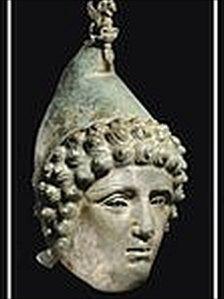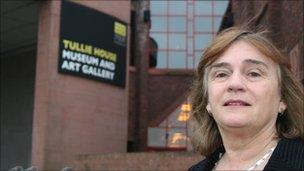Rare treasure find ignited Cumbrian appeal fund
- Published

The Crosby Garrett Helmet is believed to be one of only three found in Britain
It was found in a Cumbrian field and ended up in a London auction house.
But along the way, this bronze helmet sparked a passionate fight from a small Carlisle museum to keep it in the county.
Uncovered in the hamlet of Crosby Garrett, near Kirkby Stephen, in May, the helmet - complete with mask - is more than a mere slice of Roman history.
It sold at auction for £2m on Thursday but the buyer has not yet been revealed.
For the owner of the field and an anonymous metal detector enthusiast, it was the find of a lifetime.
But for Hilary Wade, director of the Tullie House Museum in Carlisle, it is "a jewel in the Cumbrian crown," and she was desperate to keep it in the county.
Experts believe the Crosby Garrett Helmet dates back to the late 1st Century and was probably worn by athletes during sporting events.
Christie's auction house in London described the helmet as "an extraordinary example of Roman metalwork at its zenith".
Fundraisers like Ms Wade were battling to save the artefact from falling into private hands.
'Keep it in Cumbria'
Their fight would have been a great deal easier had the helmet been made from silver or gold, or if it had been found as part of a hoard of bronze.
It would have automatically become the property of the Crown under the Treasure Act of 1996 which protects pieces of "national treasure".
But the Crosby Garrett is exempt, being made from bronze and found on its own, although Ms Wade was determined it should remain in Cumbria.
Aside from a banner displayed outside of the museum with the message: "Keep it in Cumbria, pledge your support!", Ms Wade and her team co-ordinated a media campaign, urging people to donate to the cause.
Had Tullie House successfully won the bid at auction, the helmet would have been on display in their Roman exhibition, due to open next summer.
"It really is phenomenal. It's the jewel in the Cumbrian crown," she said.
"We've had a wonderful response from other museums across the region, they've been really supportive in our fundraising campaign with the public - it's united us all.
"It seems to have brought people together, shouting: This has to stay in Cumbria."
Once worn by Roman athletes demonstrating their excellence in horsemanship, the rare treasure even captured the interest of an anonymous bidder who wanted to do his part for the cause.

Hilary Wade wants to display the helmet in a Roman exhibition at Tullie House
The benefactor pledged £50,000 of his own money on the condition that public donations matched the sum pound for pound.
But for Ms Wade and her team of campaigners, it was the fear the helmet could be bought by an international bidder that motivated the cause.
She said: "It's just absolutely essential it stays here."
There is no indication yet of who the anonymous bidder was or where they were based.
But there could be a glimmer of hope even if it was an overseas bidder.
The government could temporarily stop it leaving the country, giving Tullie House time to gather funds to match the bid.
Following the auction, the museum said it had not given up its campaign to bring the helmet to the city.
- Published7 October 2010
- Published27 September 2010
- Published23 September 2010
- Published17 September 2010
- Published13 September 2010